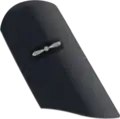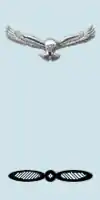Leading aircraftman
Leading aircraftman (LAC) or leading aircraftwoman (LACW)[1][2][3] is a junior rank in some air forces. It sits between aircraftman and senior aircraftman, and has a NATO rank code of OR-2. The rank badge is a horizontal two-bladed propeller.



History
The rank originated in the Royal Air Force, when it was formed in 1918. It replaced the Royal Flying Corps rank of air mechanic 1st class (which wore the same badge). It was only a trade classification until 1 January 1951, when it became a rank, although it is non-supervisory.
Countries
Australia
Leading aircraftman is also a rank in the Royal Australian Air Force (which uses a single chevron rather than a propeller device) where it is the senior aircraftman rank.[4]
Bangladesh
Canada
It was a rank until 1968 in the Royal Canadian Air Force being replaced by the army rank of private after unification, which then in 2015 was replaced by aviator (basic).
Ghana
India
New Zealand
In the Royal New Zealand Air Force, the rank is awarded after three years of service or completion of a senior trade course, whichever comes first.
Leading air cadet (LAC) in the New Zealand Air Training Corps also uses the propeller badge. It is not technically a rank (although many units regard it as a very junior NCO rank), and may be awarded to cadets who have attended a minimum of thirty parades, or completed one year in a unit. The rank is generally awarded to those cadets who show obvious leadership skill.
Sri Lanka
Zimbabwe
See also
Footnotes
- "RAF Distinguishing Insignia" (PDF). Archived from the original (PDF) on 7 March 2017. Retrieved 7 March 2017.
- RAF website
- The spellings "aircraftsman" and "aircraftswoman", despite being occasionally seen even in official documents, are incorrect in any air force.
- "Ranks". Royal Australian Air Force. Retrieved 19 October 2020.
- "BAF RANKS". Bangladesh Air Force Website. BAF Communication Unit. 2020. Retrieved 13 December 2020.
- "RANKS AND BADGES IN THE AFZ". Air Force of Zimbabwe Website. Air Force of Zimbabwe. 2020. Retrieved 13 December 2020.